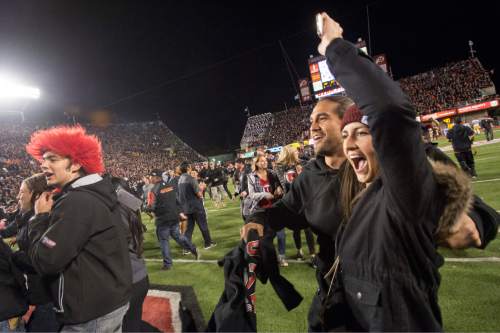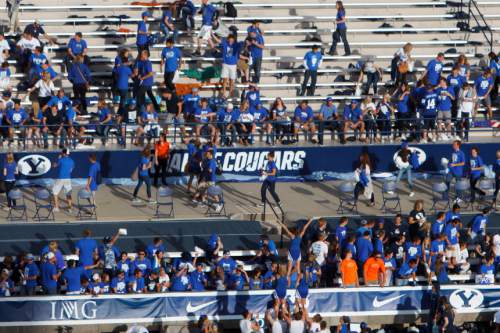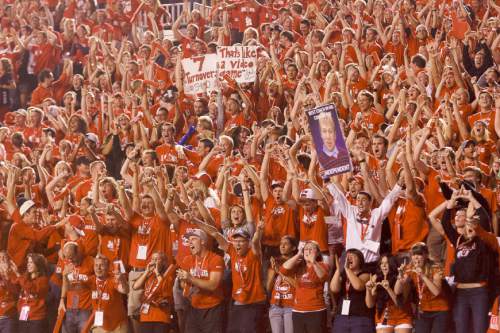This is an archived article that was published on sltrib.com in 2016, and information in the article may be outdated. It is provided only for personal research purposes and may not be reprinted.
September's Utah-BYU football game is almost guaranteed to have a different ending than the teams' last meeting at Rice-Eccles Stadium.
BYU coach Kalani Sitake should be able to walk toward the visiting locker room without any confrontation. That's a healthy development.
This week's vote by Pac-12 presidents and chancellors to fine schools when fans storm a field or court undoubtedly stemmed from incidents involving the Arizona basketball team on the road this past season — when, notably, the Mighty Utah Student Section policed itself following the Utes' landmark victory. The decision should have come sooner, considering what happened after the 2012 Utah-BYU football game.
Or during that game, technically.
Remember? The Utes drew a 15-yard penalty for fan interference when BYU's J.D. Falslev ran with the ball after Utah's Star Lotulelei blocked a tying field-goal attempt as time expired. The Cougars were awarded another try, potentially giving them a chance to win the game in overtime, but the kick hit the left upright, preserving Utah's 24-21 victory and triggering a flooding of the field — for a third time, with the first rush having occurred before one second was restored to the game clock.
The whole scene became absurd, even before the guy in suspenders continually heckled BYU coach Bronco Mendenhall on his way off the field. A couple of fans were injured that night, and it could have been worse. I'll always remember the weary look of stadium director Mark Burk, watching the sequence of events from the press box. He could enforce only whatever guidelines were enacted by the conference presidents, and now the Pac-12 is forcing schools to do something beyond the public-address announcements that never deter anyone.
The self-restraint shown by the MUSS in February when Arizona visited the Huntsman Center and anecdotal responses to this week's announcement suggest that Ute fans are on board with the policy. They're saying the Utah athletic program's rise in the Pac-12 means they're above the need for such demonstrations, and that's good.
Think about this: Two of the biggest moments in Ute football history — the 2005 Fiesta Bowl and the 2009 Sugar Bowl — came in NFL venues, where field-storming is strictly policed. Nobody who attended those games left feeling cheated after being unable to join the players in the celebration, did they?
I'm acknowledging the media tend to glorify some scenes of fan interaction. My own summary of former Ute quarterback Travis Wilson's tumultuous career highlighted how he was paraded around the field after wins over Stanford and USC. But we all can do without the potentially dangerous scenes that have unfolded locally and nationally, with some celebrations resulting in hospitalizations and other troubles barely being avoided.
Whatever sense of collegiate charm is lost by keeping fans in the stands is more than compensated by injury prevention, for the sake of students and teams alike. If fans have to forfeit some degree of entitlement, that's OK.
Following the Southeastern Conference's example, the Pac-12 is doing this right. I'm endorsing everything the presidents said this week, including a reduction of late-night kickoff times and an acknowledgment that too much time is being demanded of student-athletes in their sports. Commissioner Larry Scott deserves credit for visiting every campus in the conference in 2016 and hearing their concerns.
Utah fans love the atmosphere of night games at Rice-Eccles Stadium, and they can recite the litany of Ute defeats in afternoon home games, including last November's loss to UCLA. Yet they shouldn't be alarmed by the news of fewer late-night starts, because only Pac-12 Networks contests will be affected — and some games will move up only a couple of hours.
Ute fans are blessed to have the shortest average commute in the Pac-12, with other campuses either in the heart of metro traffic or in remote locations. So they're less concerned than other fans about late kickoffs, and they seemed to enjoy being able to rush the field in recent years.
Yet when they say they've outgrown that urge, I believe them.
Twitter: @tribkurt







